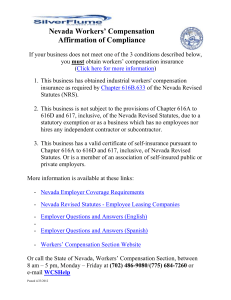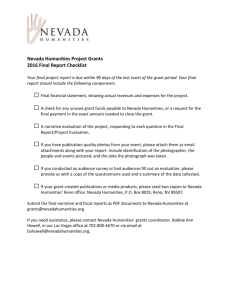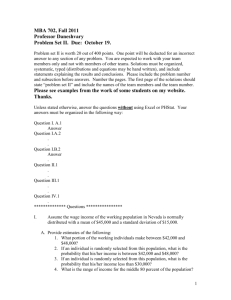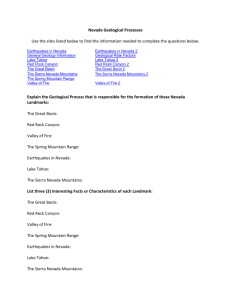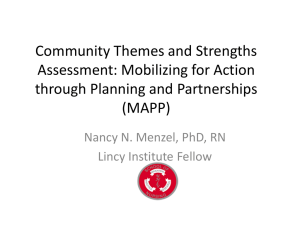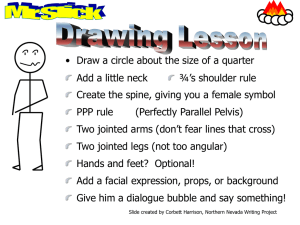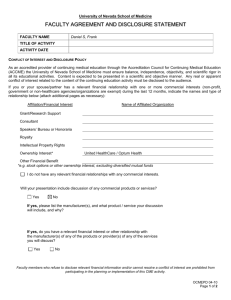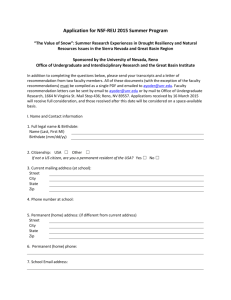Workforce Connections training to meet the health care workforce
advertisement
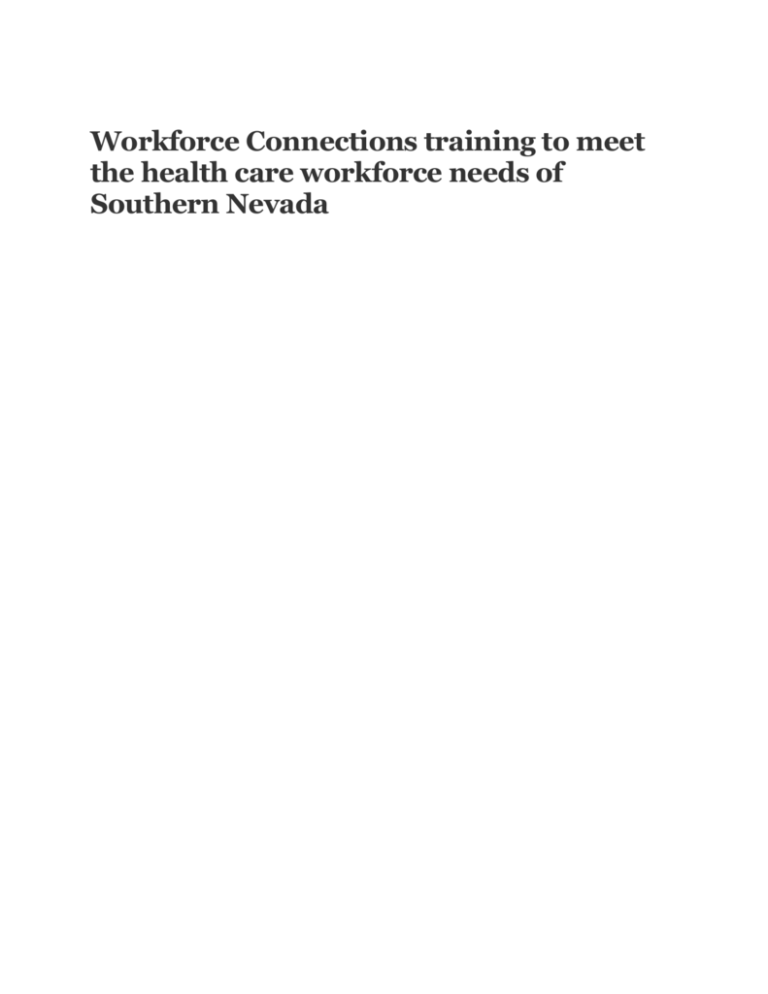
Workforce Connections training to meet the health care workforce needs of Southern Nevada By DEBRA GULLEY-COLLINS and LINDA YI Can you count the number of health professionals you have encountered during your lifetime? During the course of your birth, routine checkups, possible surgeries or emergencies, you have received care from doctors, nurses and certified nursing assistants as well as many allied health care professionals. In the event you or a loved one required home health care, a personal health care attendant or home health aide assisted you on the road to recovery. College of Southern Nevada’s home care aide training program prepares students to become an important member of a caregiving team that assists the elderly and those with disabilities with their daily living activities. A home care aide works in private residences, residential complexes, hospitals and adult day care facilities. The personal care provided by a home care aide requires an individual to be sensitive to the needs of clients and their circumstances. The program trains students to help clients with many daily living activities from basic hygiene, dressing, transferring clients from beds to wheelchairs, and preparing meals to general housekeeping and occasional transportation assistance. Basic skills are also included in the training program. Tutors are available in their studio lab to assist with General Education Development preparation and other academic subjects, as well as language and workplace skills. As Nevada continues to experience a shortage of nurses and other allied health care professionals, there are changes we can make to position Nevada to ease these shortages. However, we must act now or the crisis will worsen because of the Affordable Care Act and the number of baby boomers retiring and requiring additional care. An adequate supply of trained health care professionals is essential to ensure that Nevada’s health care providers continue to meet the growing demand for services by our citizens. Recent reports indicate that the market for health care labor has tightened; however, current five- and 10-year projections show robust growth in virtually every health care-related occupation. Workforce Connections explores health care strategies that create job opportunities for Southern Nevada’s workers. Workforce Connections works directly with employers to identify and classify new jobs that will need to be filled as well as providing the funding and resources to train individuals for these jobs. Workforce Connections’ One-Stop Career Center at 6330 W. Charleston Blvd. is available to Southern Nevadans to assist with training and employment opportunities. The direct line is 702-822-4200. Workforce Connections works in concert with local nonprofit and other organizations to recruit, case manage, train and place individuals in careers that will lead to career laddering and a livable wage. The nonprofit groups with Workforce Investment Act funds from Workforce Connections include Bridge Counseling Associates, Easter Seals of Southern Nevada, Foundation for an Independent Tomorrow, Goodwill, GNJ Family Life Center, Latin Chamber of Commerce Community Foundation, Lincoln County School District, Nevada Partners Inc., Nye Communities Coalition, Southern Nevada Regional Housing Authority and Nevada Hospital Association. All “funded partners” train in health care, helping to prepare participants for the various career opportunities that have been forecast. One career opportunity is nursing. Nevada confronts a nursing shortage that negatively affects the health of our citizens as well as the strength of our economy. Workforce Connections has contributed more than $1.7 million in Southern Nevada to provide new nurse graduates with the opportunity for a nurse residency. Workforce Connections provides financial incentives to employers to furnish employment opportunities to new nurse graduates. Several area hospitals and health care facilities are hiring these new graduates. Without Workforce Connections’ funding, many would not find employment in Southern Nevada. The Health Care 20/20 program uses high-fidelity simulation training from many health care programs across the country. Complete Medical Consultants in conjunction with the Nevada Hospital Association offer training for new graduate nurses employed at area hospitals. Each session includes hands-on scenarios and is followed by post-simulation debriefing sessions to promote critical thinking. Scenarios use a manikin and common and Advanced Cardiac Life Support medical equipment. The manikin is controlled by a computer and is able to breathe, talk and interact with the students like a real patient. Students work in teams for each scenario in which the patient condition changes, requiring the students to assess and react to the change. After the scenario, students participate in a group debriefing about what went well and what needs improvement. Lissa Ricci, a registered nurse who graduated from the College of Southern Nevada in May, is employed at Sunrise Children’s Hospital’s Labor and Delivery Unit. Ricci is participating in the Nevada Hospital Association’s Healthcare 20/20new graduate nurse residency program. Like all new graduates, Ricci was concerned about her transition from student nurse to registered nurse and the accompanying responsibilities. She said her nurse residency experience was “fabulous.” A seasoned registered nurse works with Ricci one on one, allowing her to improve her skills and gain the confidence. Ricci said she establishes weekly goals that are reviewed with her nurse mentor, allowing for “self-reflection” at the end of each week to determine her improvement or the need for additional experience. Listening to Ricci’s account of her experience underscores nursing workforce data that to retain new nurse graduates, we must allow time and provide professional support to transition from education to practice. This is important because the largest groups of health care workers in the United States are registered nurses. A 2010 study done at the Institute of Medicine identified nursing as the most effective way to improve the health of all Americans. The Institute of Medicine recommended eight ways to accomplish this goal. These centered around nursing education, training and career laddering opportunities as well as effective workforce planning and data collection. Together with the Robert Wood Johnson Foundation and AARP, the Future of Nursing: Campaign for Action was born to achieve the eight recommendations. States were encouraged apply for Action Coalition status by identifying work already achieved on the eight recommendations. Each state Action Coalition is required to have a nursing and non-nursing entity to lead the coalition. Nevada received Action Coalition status with the Governor’s Workforce Investment Board, Health Care and Medical Services Sector Council assuming the non-nursing lead and the Nevada Alliance for Nursing Excellence the nursing lead. The Health Care and Medical Services Sector Council is composed of 29 members representing public and private education, labor, business, heath care systems and professional health organizations. Dr. Marcia Turner, vice chancellor of health sciences for the Nevada System of Higher Education, is the sector council chairwoman, and Debra Scott, executive director of the Nevada State Board of Nursing, is the vice chairwoman. The Nevada Alliance for Nursing Excellence is a professional nursing organization that aims to develop “a premier system for nursing education and practice providing for expertise and optimal capacity of the nursing workforce to ensure a healthy Nevada.” Debra Gulley-Collins, program manager at Workforce Connections, is the chairwoman. The Nevada Action Coalition is headed by volunteers from the Health Care and Medical Services Sector Council, Workforce Connections and the Nevada Alliance for Nursing Excellence. Dr. Debra Toney, a Robert Wood Johnson alumni fellow, serves as the executive committee chairwoman. The coalition’s work has been limited by the number of volunteer hours that members can devote. It also has prevented the coalition from reaching out to nurses in Nevada, advising them of the work of the coalition and encouraging them to become involved. Based on these concerns the Nevada Action Coalition submitted a proposal to the Robert Wood Johnson Foundation for a grant that would allow Nevada to hire an executive director and an assistant to work on two of the Institute of Medicines’ recommendations. The Nevada System of Higher Education took the lead on the grant proposal with Turner as the principal investigator. Together with the Employment, Training and Rehabilitation Department, they have supplied the organizational and funding match required by the foundation. Word was recently received that Nevada is a grant finalist. Funding announcements by the foundation are expected in early November. The Nevada Action Coalition chose two recommendations as its focus in the grant proposal. The initial focus will be to work on increasing nurse residency programs throughout the state for new nurse graduates and for registered nurses returning to the workforce after a significant absence. The other will be to increase the number of bachelor prepared nurses in Nevada by 2020 by encouraging matriculation agreements between public and private colleges/universities with the community colleges in Nevada, thereby allowing the associate degree prepared nurse to advance seamlessly in his or her education. Debra Gulley-Collins is a program manager of the Adult and Dislocated Worker program. Linda Yi is the coordinator for the Nevada Coalition. As Nevada awaits notification of grant receipt, we invite all nurses or non-nursing organizations to become involved in Nevada’s Action Coalition. For more information, contact Collins at dcollins@nvworkconnections.org or Yi at linda-yi@nshe.nevada.edu. For more information about Workforce Connections please contact Collins at the above email address or call her at 702-638-8750.
